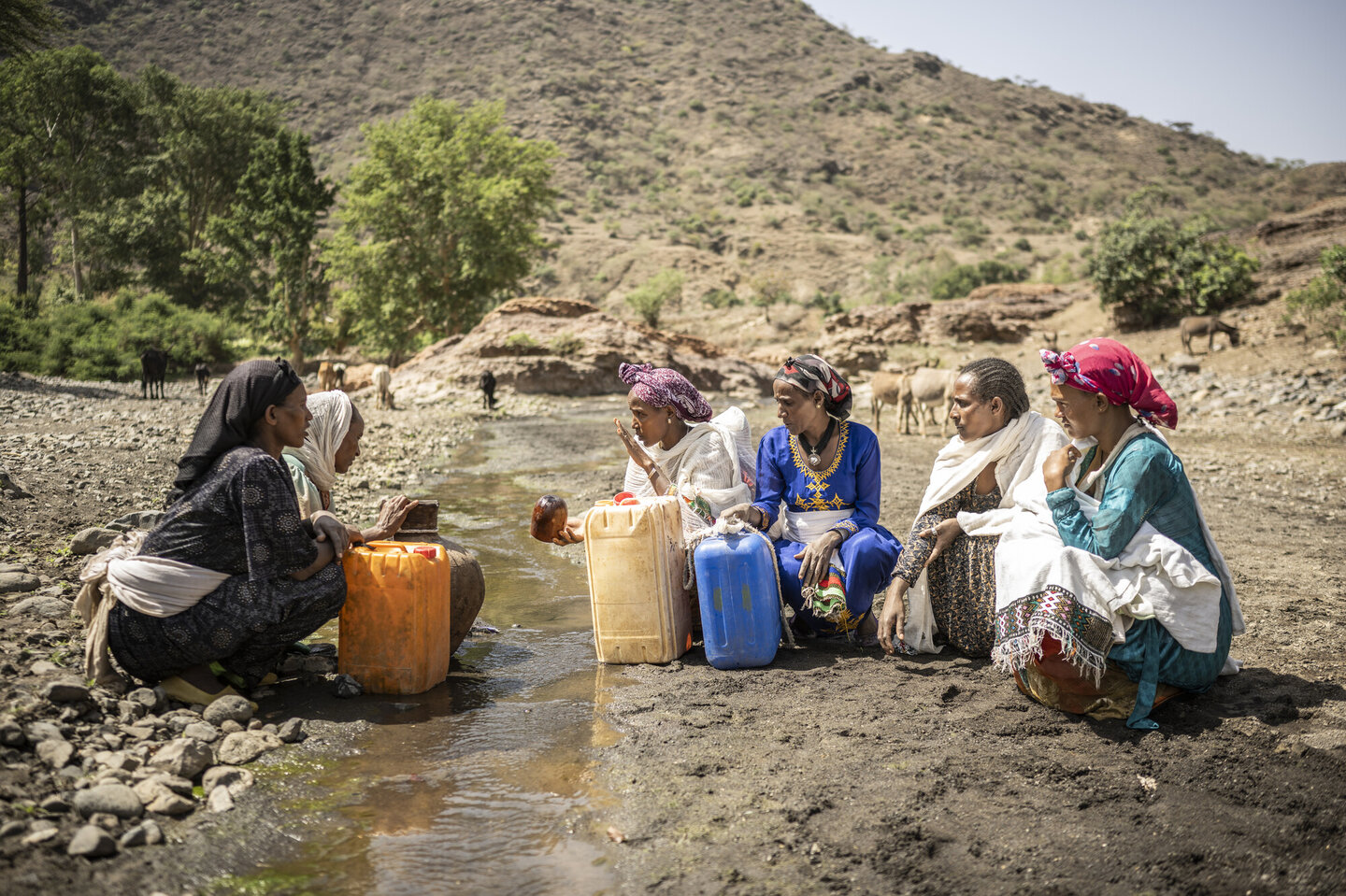The journey from Emebet's village of Birbir to the Diba River takes two hours and follows gravel tracks and footpaths over high mountains and through valleys. Twice a day, the 31-year-old and other women used to walk this path to fetch water.
Eight hours — a working day on top of their actual working day — were spent exclusively on this task.

Fear in the night
Immediately after waking up, each woman would set off at night when it was still dark and cold. They went alone so they wouldn't have to wait for others. On the way they encountered poisonous snakes and wolves, and often bandits. “Especially at night, thieves would take our shoes and jewelry, or men would sexually harass us. We were very afraid,” she says hesitantly, and continues: “I also have friends who were raped on the way to the river.”

In June, shortly before the rainy season begins, the river is nothing more than a trickle. “We dug a hole in the ground with our hands that would fill with river water and then we could scoop it,” explains Emebet. Many villagers, sometimes up to 80 at a time, would then crowd around this spot on the river and fight for a good place to scoop water. She often had to wait in line for a long time. “There was a lot of fighting,” she recalls. Fighting over what little water was there.
"We were ashamed."
“And the river water there was dirty — too dirty to drink. But we had no choice.” As if to illustrate this, a cow urinates into the river at that moment.
Emebet, her husband and her children were frequently sick with worms and diarrhea. “We also had skin rashes and often smelled bad — and were endlessly ashamed of it.”

Finally, a well in the village
We return to the village of Birbir, population 1,500, and go to Emebet's home on the hillside in the lower part of the village. Under a tent made of rain tarpaulins, there is a worn pool table and a bull and a cow are tied up. Emebet uses the cow's milk to make yogurt, which tastes sour and is seasoned with chili powder. She shares the two-room house with her husband Abadi Belay, an animal health worker, and their three children.
Now Emebet begins the coffee ritual that is typical in Ethiopia. She crouches on the floor, which is covered with fragrant leaves, and pours coffee into small cups for us. Incense in a small bowl on coals exudes a soothing scent. The coffee ceremony is traditionally an opportunity to talk about personal matters. This is also the case now; Emebet wants to talk about the new well in the village while sipping her steaming cup of coffee. The well that has "changed everything for the better.”

A few years ago, a pump well was installed in the village to supply the people of Birbir with clean water. There are now two such pumps. Emebet says that they are no longer sick and constantly tired. The wounds on her arm have disappeared because she can now wash properly. The shame is gone, too.
The fact that the well was built is also thanks to Emebet's father, Mekonnen Mesgie: He had been campaigning for it for many years. However, problems were not completely solved by the new well. In Ethiopia, the government and international organizations invest considerable sums in the construction of water systems. But operation and maintenance are often not regulated, or the authorities lack the funds, expertise and commitment necessary to keep them running over the long term.
“When the wells broke down, we had to go back to the river,” says Emebet. “My daughter was already born by then and could walk, so I had to take her with me. She cried the whole way,” says Emebet, pausing. “It broke my heart and deeply disturbed my inner peace.” Having to go back to the river, “back to square one,” was almost worse after she knew what life was like with a well.
Emebet Mekonnen
A village gets organized
To put an end to fetching water from the river once and for all and to strengthen the sustainability of existing water systems, Helvetas has launched a project in Amhara that makes drinking water permanently available. With Helvetas' support, around 150 water committees have been established to date. These are committees of seven to nine residents who take responsibility for matters relating to the well: fencing, security, scheduling who is allowed to draw water and when, as well as maintenance, repairs and financing. Helvetas supports the committees in gaining legal recognition. Official recognition allows them to establish binding rules for the wells and significantly increases the villagers' sense of responsibility.
Emebet's father, 60-year-old Mekonnen, is chairman of the committee in Birbir. Emebet's sister-in-law, Birhane Negusu, is also a member. The 29-year-old, who was elected for three years, convenes the general meetings and serves as treasurer. “We collect a small annual fee from the people of Birbir in case something breaks or a part needs to be replaced.” This amounts to 130 Ethiopian birr — the equivalent of around one US dollar. “Fortunately, everyone can afford that,” says Birhane. “We use the money to pay the young people who maintain and repair the wells.” Birbir takes good care of its water, and the well repairers come by about twice a year.
An unstoppable well repairer
Helvetas trains young unemployed people in Amhara to become well repairers and entrepreneurs and supports them in setting up their businesses with tools and well spare parts, as well as knowledge and technical skills. In addition to practical training, Helvetas teaches them about business management, financial planning and mental health. “As unemployed people, many of them had no regular daily structure. They are often insecure and no longer have much confidence in themselves,” explains Belayneh Tilahun from Helvetas Ethiopia, who is in charge of the project.

Five other young entrepreneurs currently work with Hareg in the workshop in Sekota. Hareg is one of two women there. Her business is doing well, and the mental health training is also bearing fruit: “It's still rather unusual for a woman to repair wells. But you can't give up just because something is unusual,” says Hareg in a quiet but firm voice. “I won't let anything stop me. I have the knowledge and the courage to do it.” If there is a job she cannot do physically, a colleague helps her.
And if a village calls her that she cannot reach on foot or by bus, her colleague takes her there on his motorcycle. “The men in the team support me, but they don't take anything away from me just because I'm a woman. We help each other a lot.”
In Sekota, the water situation has never been as precarious as in the villages, says Hareg, who grew up in the city. "It makes me sad that there are people who have to drink from the river. Everyone should have clean drinking water.” That's why her work is so satisfying. “When I repair a well, I can make people happy again. That makes me very proud."
The workshop team uses around a third of their income to further expand their business. Hareg says, almost mischievously, that she would like to build new wells at some point.
Thanks to functioning wells, Emebet now has time for other meaningful activities, such as tending to the animals and the children. And for the small bar through which she earns her own living.

New dreams are also drifting into Emebet's thoughts: She would like to open a small grocery store in Birbir and is now saving for the start-up capital. And Emebet, who was never able to finish school because her parents were too poor, wants to give her children an education. “I'll do anything for that,” she says, with a look that hints at everything she has left behind.
The North Gondar and Wag Hemra zones of Amhara are part of Ethiopia's “poverty belt.” Water supply systems are either lacking or defective in many places. There is also a shortage of skilled workers who can maintain and repair existing wells. At the same time, unemployment is particularly high among people under the age of 30. They make up 70% of Ethiopia's population, and 11.7% of them are officially unemployed. Jobs are scarcer in cities, especially for women, who often have little education and face prejudice in the workplace.
In the “Youth Enterprise Services (YES) Amhara” project, Helvetas trains young unemployed people in North Gondar and Wag Hemra to offer water-related services. The project has been so successful that the government has asked Helvetas to extend it to other areas. Since the project started in 2021, Helvetas has supported 13 young companies that maintain 440 water supply systems, which in turn benefit over 323,000 people. The project is financed by donations and foundation contributions.
The Context in Ethiopia: Climate Change and Conflict
Climate change poses major challenges for Ethiopia. Several droughts have repeatedly threatened food security in recent years. Rain only falls for around three months of the year. Helvetas has been active in the country since 2002, working on erosion control, climate change adaptation, infrastructure projects and training courses that help people earn an income.
The war in the Tigray region, which lasted until 2022 and cost around 600,000 lives, received little media coverage. It gave rise to conflicts that continue to this day, especially in the neighboring Amhara region, where the project is being implemented.







